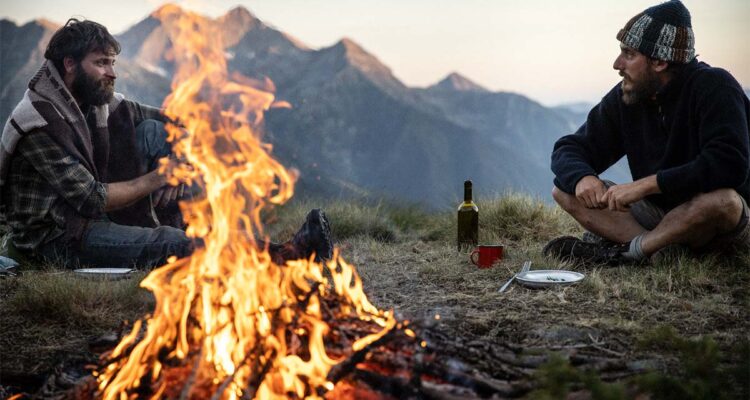For his most subdued film yet, Belgian director Felix van Groeningen, along with co-directing partner Charlotte Vandermeersch take to the Italian Alps for a decades-spanning story of friendship. Following Groeningen’s solo effort, 2018’s “Beautiful Boy,” “The Eight Mountains” is a quiet return to form with its stunning mountain scenery and strong performances from Luca Marinelli and Alessandro Borghi, but this elegiac personal epic is far too languid for its length.
READ MORE: Cannes Film Festival 2022 Preview: 25 Must-See Films To Watch
The alpine town of Grana operates as a kind of Eden-like escape for 12-year-old Pietro (Lupo Barbiero). On his summer vacations with his mother in the ‘80s, he revels in the endless open space and the isolation, soundtracked only by rustling insects and rolling streams. There, he meets Bruno (Cristiano Sassella), who laments being the “last child in the village”, as the population of his home has dwindled from 183 to a measly 14. With the lack of people around to enjoy childhood with, it’s unsurprising that, despite their opposing personalities, the hardened Bruno takes to timid city kid Pietro.
The film spends its first 30 minutes with the boys as they run through tall grass, climb up abandoned houses and explore their sleepy town. If “Beautiful Boy” was doused in raw, tear-stricken emotion in lieu of genuine intimacy, “The Eight Mountains” is a marked improvement for its unabashed sincerity. A scene where the boys wrestle in a field is captured with an extreme close-up on their wide smiles, setting the foundation for Pietro and Bruno’s quixotic memories that stay with them to adulthood. When Pietro’s father returns from his factory job, he takes the boys along for hikes up the surrounding mountains and glaciers, though Pietro’s altitude sickness prevents him from keeping up. The film is marvelous to look at, using wide shots and long takes to absorb the sheer magnitude of the scenery of Grana.
When Pietro’s parents suggest taking Bruno back to Turin for schooling, his father forces him to work on construction sites every summer, separating the two friends for the next 15 years. As an adult, Pietro (Marinelli) inherits a plot of land on the mountain from his father and finds himself drawn back to Grana. “My life seemed partly that of a man, that of a boy,” Pietro says at one point through voiceover, as if with each time he returns, Grana is in a stasis where he’s reduced to that boy once unencumbered by life. Reunited with Bruno (Borghi), the pair build a new cabin together and silently wrestle with how much they’ve grown apart. Bruno has firmly planted his roots at home, while Pietro’s ambition leads him to become a writer and venture out to Nepal. Their project repairs their bond, but also reinforces the grief Pietro feels not only with his father but with Bruno, as he mourns the experiences lost to separation and stubbornness. At one point, Pietro looks forlornly at his father’s map of the mountains annotated with the many routes he took with Bruno, and realizes that the pair were much closer than he once thought.
“The Eight Mountains” is gentle in its storytelling, honing in on tender moments as Pietro and Bruno flit in and out of each other’s lives over the course of 30 years. It’s sparsely told, perhaps too sparse. Clocking in at two and a half hours, the story doesn’t pack nearly enough to warrant the runtime, preferring to savor the stunning vistas over plot. The occasional voiceover is certainly more lyrical than the usual exposition dump, as Pietro speaks of his body “forgetting nettle stings” with time, but it nonetheless feels like a crutch when the rest of the film offers little in the way of plot or progression. You can only watch Marinelli walk down a mountain for so long until the beauty begins to wither.
Even for a film as understated as it is, the performances are just as remarkable as the view. Luca Marinelli, best known for his dynamic turn in “Martin Eden”, displays a much softer side rarely seen since his earlier roles in deep cuts “The Solitude of Prime Numbers” and “Every Blessed Day”. There’s depth to Pietro’s quietness, and it’s a testament to Marinelli’s versatility that even at his most low-key, he proves to be equally as compelling. The real-life close friendship between Marinelli and Borghi also naturally lends itself to easy chemistry between their characters. Building on the brotherly connection established in their previous collaboration, the underseen crime drama “Don’t Be Bad,” the actors create a bond between Pietro and Bruno that feels effortless. “The Eight Mountains” is a sentimental ode to those singular friendships we make in our lives, the kind that can’t be severed by any amount of distance, physical or temporal. Even when there’s so much left unsaid, it’s the comfort they find in each other that resonates most. [B]
Follow along with all our coverage from the 2022 Cannes Film Festival.

